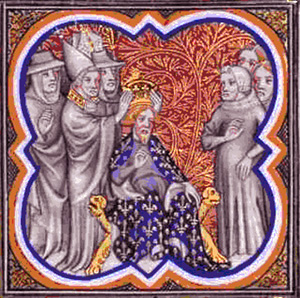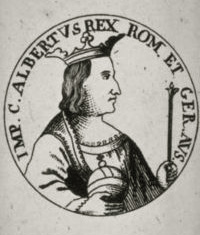 |
World History
The Doctrine of Translatio
Hugh O’Reilly
According to the doctrine of translatio [move, change of place], the Sovereign Pontiff has the supreme power to consecrate or set aside the Emperor. This is a consequence of the doctrine of the two swords expounded by Pope Boniface VIII in his Bull Unam Sanctam. Should a Pope dismiss an Emperor, he would transfer the imperial power to another noble whom he would consider more worthy.
The following considerations explain how this doctrine came to light and was accepted by both the spiritual and the temporal powers. The title King of the Romans was a dignity given by the Popes only to the Emperors of the Holy Roman German Empire.
The weakness of the first Kings of the Romans after the Interregnum (1) favored the success of the Popes in obtaining the formal recognition of the principle of translatio. This was a great triumph for Boniface VIII and, a quarter of century later, for Nicholas III.

The foundation for translatio came from the Pope Leo III crowning Charlemagne Holy German Emperor |
In 1273 Pope Gregory X conferred the title of King of the Romans to Rudolph of Habsburg to make it clear that the final word in bestowing this dignity belonged to the Sovereign Pontiff. According to his promises to Gregory X before the coronation, Rudolph considered himself a provisory administrator of the Empire by the favor of the Holy See, and oriented his future Italian politics in accordance with the Pope’s wishes.
In 1279 Rudolph gave the territory of Romagna to Nicholas III, who in part revived the spirit of Innocent III. Doing so, he proclaimed the superiority of the papal power over that of the kings and sanctioned the doctrine of translatio. On that occasion also, the German Princes acknowledged that they had received their privilege to elect the Emperor from the Vicar of Christ, the greatest luminary of Christendom.
A still more brilliant success was achieved by Boniface VIII, a Pope par excellence. As a consequence of a quarrel between Adolph of Nassau, who was elected Emperor by the Princes, and Albert of Habsburg, who had inherited the Empire from his father, Emperor Rudolph, Albert went to Pope Boniface VIII asking to be considered the legitimate Emperor. The Pope confirmed his claim in a solemn speech on April 30, 1303, at a public consistory. This German case illustrated to the eyes of the world not only the plenitude of the spiritual power but also the indirect temporal power exercised by the Pope.
The foundation of this plenitude is the doctrine of the transferral (translatio) of the imperial power the Sovereign Pontiff made for the German peoples in the person of Charlemagne when the Pope founded the German Empire. That gesture demonstrated that the Pope can dispose of rege et regna [kings and kingdoms]. All that the Empire has of preeminence and dignity, it owes to the Papacy. From the Popes the Emperors received not only the power of the sword, but the ensemble of their powers. The election that takes place in Germany to choose the Emperor acts as a simple proposal until the Pope confirms the one who was elected. This confirmation signifies his elevation to the imperial power and royalty.
Even after he was confirmed, the sovereign would remain under the vigilance of the Pope, who could depose him. The Pope could carry out a new translatio of the imperial power should he deem it convenient. He could also return the imperial territories to the Roman Church, who was their first proprietor. The translatio of the Empire is, from many points of view, the sign that the first source of the imperial power is the Pope.

Albert I of Habsburg, King of the Romans and German Emperor |
Independent of this subjection of the King of the Romans or the Emperor of the Germans to the authority of the Successor of Peter, Boniface VIII proclaimed the Emperor to be the supreme sovereign of the world, to whom all the Kings should be subordinate by law. At least in 1303 the King of France was the only exception to this rule. Thus, according to Boniface VIII, the Empire benefited from the privileges of the pontifical power. Under the high authority of the Pope, the Emperor reigned over the temporal sphere - super reges et regna [over kings and kingdoms].
This doctrine was fully approved by Albert of Habsburg. On April 30, 1303 his chancellor John of Zurich affirmed the supremacy of the Roman Pontiff in these words:
“Thou are the Lord, not only of a land or a country or a province but of the whole universe, without any limit. To thee these words of Isaiah apply: ‘Thou art our judge; thou art our lawmaker.’ The Kingdom of the Romans is the Kingdom of the Church. Since thou art the supreme judge of all, thou cannot be judged by any one.”
Some weeks after, Boniface VIII received a message from Albert in which the King of the Romans officially adhered to the doctrines of the two swords, translatio and the papal origin of the power of the Elector Princes. Albert also expressed his fidelity and obedience to Saint Peter and to Boniface VIII and his successors. He closed by affirming himself a vassal of the Pope, homo Papae.
1. The Interregnum or Great Interregnum was the period during which the throne of the Holy Roman German Empire was vacant due to political and religious complications. It lasted from the death of Emperor Conrad IV (1254) to the election of Rudolph of Habsburg (1273).

Based upon and translated from Robert Folz
La Légende de Charlemagne dans l’Empire Germanique Médieval
Geneve: Slatkine Reprints, 1973, pp. 295-297
Posted June 19, 2009

Related Topics of Interest
 The Donation of Charlemagne The Donation of Charlemagne
 Hernan Perez del Pulgar of the Valiant Deeds Hernan Perez del Pulgar of the Valiant Deeds
 The Birth of Portugal The Birth of Portugal
 The Investiture of a Knight The Investiture of a Knight
 The Organic Formation of Feudalism The Organic Formation of Feudalism
 The Dream of Empire The Dream of Empire
 The Coronation Feast for an Emperor The Coronation Feast for an Emperor

Related Works of Interest
|
|
History | Home | Books | CDs | Search | Contact Us | Donate

© 2002- Tradition in Action, Inc. All Rights Reserved
|
 |
|